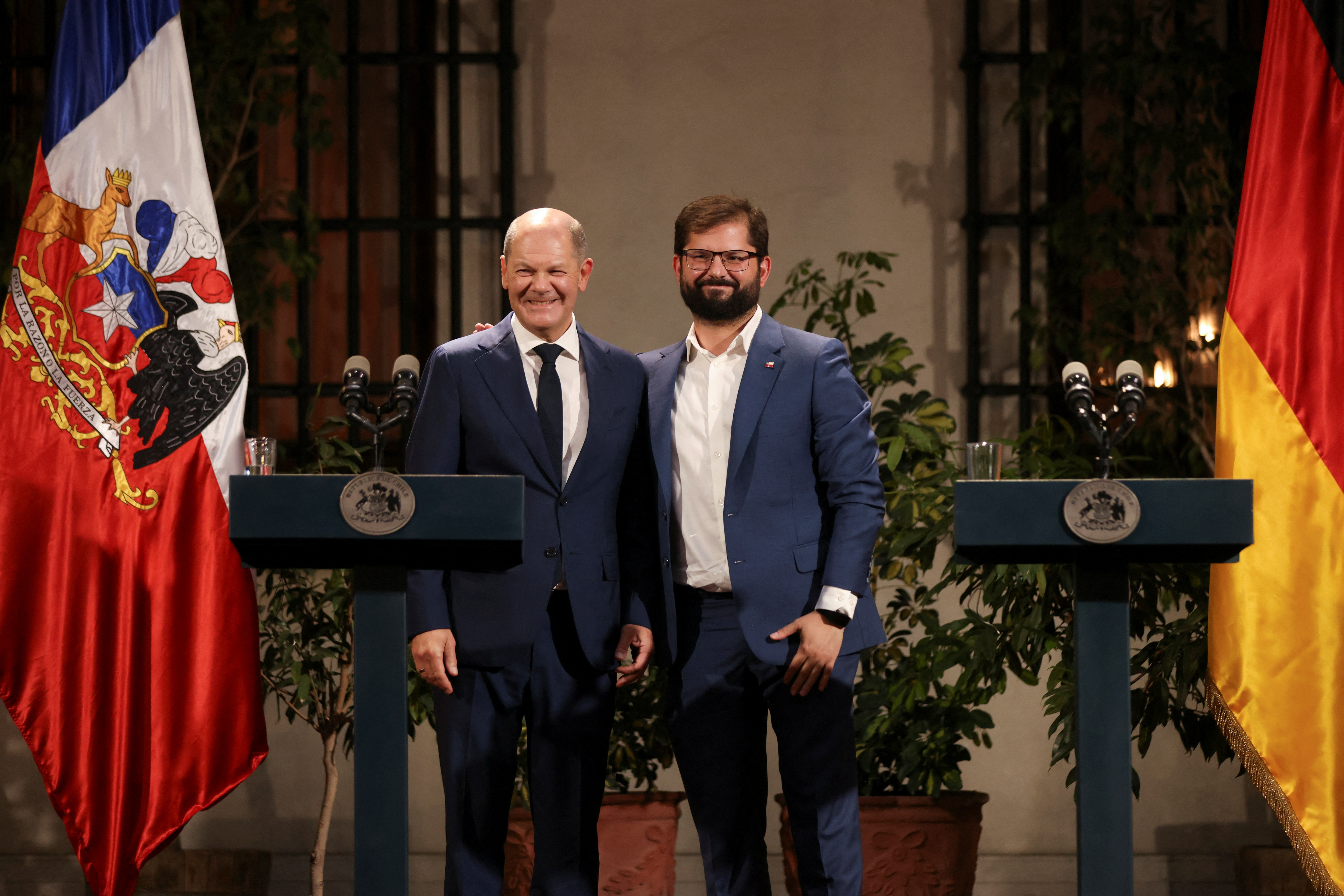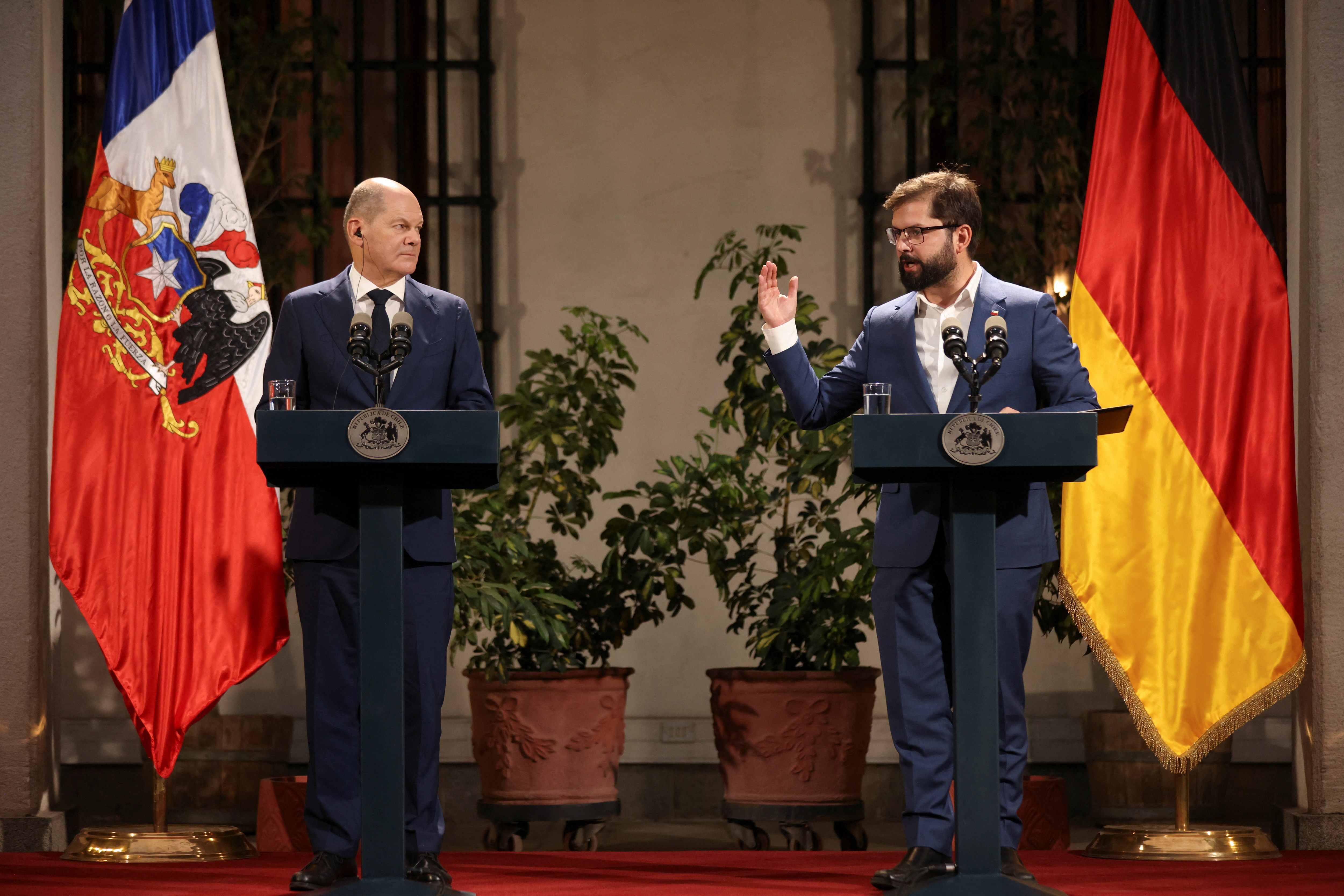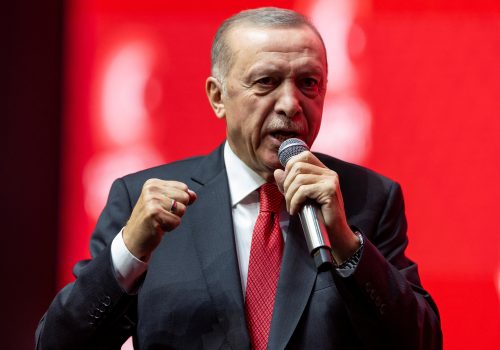Panzer.
Say the word slowly, employing your best German accent, with a hard “P” at the front, a soft “r” at the end, and pronouncing the “z” as a confident “ts” in the middle.
Panzer.
Then try out the following compound words: Kampfpanzer (main battle tank) and Panzerschlacht (armored operations). For further effect, don’t leave out Blitzkrieg (lightning war), Germany’s use of surprise, speed, and armored superiority to overwhelm enemy forces and overrun Europe during World War II.
To understand the significance of Germany’s decision this week to provide fourteen Leopard 2 tanks to Ukraine, it’s worth understanding how much more history-laced and emotion-laden the word Panzer is for German speakers than is the word tank for the English-speaking world.
It captures at the same time all the pride Germans feel in their capacity for advanced engineering alongside the horrors in how that capacity was deployed to advance a murderous dictator’s revanchist and expansionist ambitions, at the cost of millions of lives. The memory of it all elicited a national consensus: “never again.”
This week’s media reports on the Leopard decision instead focused on perceived dithering by German Chancellor Olaf Scholz, not wanting to be out in front of his US allies, until US President Joe Biden agreed to deliver Ukraine thirty-one M1 Abrams tanks. (The German decision will also unlock the delivery of a total of around eighty Leopard 2 tanks from various European arsenals.)
However, as important as the tanks will be to Ukrainians’ hopes for retaking their territory this year, and fending off an anticipated Russian offensive, what’s more significant are the two stories that lurk behind their delivery.
The first story is about an unfolding German Zeitenwende, or historic turning point, as Scholz has called it, that would redefine the German and European role in a dramatically changing world of renewed authoritarian challenges.
The second is a growing recognition among Ukraine’s allies and friends that Kyiv requires an immediate surge of military and other support, as I argued last week in this space. While Russian President Vladimir Putin’s capacity to escalate the war, particularly his nuclear arsenal, remains a great concern, US and European officials alike increasingly realize that if they don’t provide Ukraine the wherewithal to stop Putin, then at some point they might need to put their own soldiers in harm’s way to do so.
How these two stories play out will do much to determine whether Putin’s criminal war against Ukraine, launched on February 24 last year, will result in a stronger Europe and a safer and freer world, or produce just the opposite.
Scholz first began to lay out this change in German thinking in his Zeitenwende speech to the Bundestag on February 27, 2022, just three days after Putin’s invasion. He has been building upon that since, particularly in an insufficiently noticed must-read essay in Foreign Affairs.
Until recently, the prevailing argument was that history imposed upon Germany a unique degree of political modesty and military restraint. What the Russian invasion unlocked was the embrace of a healthier, more activist approach to redefine the “never again” mantra as one that requires Germany to stand against any authoritarian aggressor who wishes to dictate European or global affairs through military force.
“My country’s history gives it a special responsibility to fight the forces of fascism, authoritarianism, and imperialism,” Scholz wrote. “At the same time, our experience of being split in half during an ideological and geopolitical contest gives us a particular appreciation of the risks of a new cold war.”
Among other measures in Scholz’s Zeitenwende speech, he announced that his government would spend 2 percent of its gross domestic product on defense and use a one-hundred-billion-euro fund to better equip German armed forces, even changing the country’s constitution to do so. In his Foreign Affairs piece, Scholz called it “the starkest change in German security policy since the establishment of the Bundeswehr [German armed forces] in 1955.”
What Scholz also did in the Foreign Affairs piece is put Germany’s response to the Ukraine war in a larger context as a global “ Zeitenwende: an epochal tectonic shift,” building upon Biden’s oft deployed phrase of ” an inflection point.”
Wrote Scholz, “When Putin gave the order to attack, he shattered a European and international peace architecture that had taken decades to build. Under Putin’s leadership, Russia has defied even the most basic principles of international law… Acting as an imperial power, Russia now seeks to redraw borders by force and to divide the world, once again, into blocs and spheres of influence.”
If Scholz and Biden are correct regarding a historic turning point, and all evidence indicates that they are, then Ukraine’s friends and allies must do even more now to ensure its survival as a free and independent country—and ultimately its embrace, as former US Secretary of State (and Atlantic Council board member) Henry Kissinger argued this month, into NATO and other European institutions.
For the moment, nothing is more important to achieving that goal than providing Ukraine the modern weapons it needs—and fast—to save its people’s lives, head-off a planned Russian offensive, and retake lost Ukrainian territory.
Like dictators before him, Putin is obsessed. Until Ukraine demonstrates to Putin that he can’t achieve his objectives by force, he will not give up in his efforts to conquer and absorb Ukraine. And if he can’t conquer the country, he’s shown he is willing to destroy it.
Ukraine and its friends are in a race against the clock as Putin claims to have mobilized three hundred thousand additional soldiers for the Russian army, including twenty thousand volunteers. Russia’s Wagner Group has put thousands of convicts into the fight, and Russia is pressuring Belarus to provide more assistance as well.
The time is now to give Ukraine the list of military equipment it urgently needs: Western armor and combat aircraft, up to and including the F-16; longer-range artillery and missiles, with a green light to hit the targets inside Russia from which Russia is killing Ukrainians; and large stocks of capable drones and air-defense systems that can stop everything from ballistic and cruise missiles to manned aircraft and drones.
With that, Ukraine can stop Putin. That is the most effective way to ensure that this Zeitenwende turns in the right direction.
Frederick Kempe is president and chief executive officer of the Atlantic Council. You can follow him on Twitter @FredKempe.
THE WEEK’S TOP READS
#1 Transatlantic ‘growing pains’: how Olaf Scholz made Joe Biden shift on tanks for Ukraine
James Poiliti, Courtney Weaver, Laura Pitel, and Guy Chazan | FINANCIAL TIMES
For an understanding of the behind-the-scenes negotiations and diplomatic exchanges that led to the United States and Germany agreeing to send tanks to Ukraine, read this fascinating FT report on how the deal came about.
“The breakthrough,” the FT reports, “involved tense negotiations, policy U-turns and leaps of faith in both Berlin and Washington that tested the strength of US-German relations as a fundamental pillar of the western alliance. They also underlined how, for all its talk of taking on a leadership role in the world, Europe is still deeply dependent on America as a guarantor of its security.”
On the German side, the FT notes, “Officials in Berlin said the frustration expressed by some allies was unfair. Germany is, after all, one of the largest suppliers of military assistance to Ukraine after the US. There is also a particular sensitivity in Germany about tanks, which they say the country’s allies have failed to understand. ‘If tanks with German crosses appear on the battlefield, Putin can say — look, it’s what I’ve said all along, NATO is intervening in this war,’ said one official. ‘It’s an RT [Russia Today] narrative that has a lot of resonance in Latin America and Africa and we need to be aware of that.’” Read more →
#2 Can Germany Be a Great Military Power Again?
James Angelos | NEW YORK TIMES
In this brilliantly reported narrative, James Angelos offers a deep dive into the problems and hopes of the German Bundeswehr in a Europe where Putin has torn up the post-Cold War order.
“’My generation, I always say,” Anne Katrin Meister, a German reservist, told Angelos, “is a bit like a generation without war… Of course, there were conflicts, like in Kosovo, but we were still relatively young, and we grew up in such a safe, ideal world. But this is now changing… you can only be a pacifist if you have this safe, ideal world. And we don’t have such a world.”
Writes Angelos, “It was the Russian threat that led to the resurrection of the German military during the Cold War; it’s once again the Russian threat that may lead to its revitalization. Meister and her fellow trainees see joining the reserves as their democratic duty, and the officer running the training program in Nienburg told me that interest in the reserves rose sharply in the days following Russia’s invasion. But many Germans don’t share that enthusiasm, and the war has not led to a boom in recruitment for the Bundeswehr as a whole. Still, there are signs that a historic shift — a growing acceptance of the need to wield military power — is taking root in Germany.” Read more →
#3 Putin’s Miscalculation
Fred Kaplan | NEW YORK REVIEW OF BOOKS
Fred Kaplan’s review of Mark Galeotti’s new book on the modern Russian military is worth reading as an examination of why the Russian military has performed so poorly in Ukraine.
“Has the Ukrainian army turned out to be much better than imagined, or has the Russian army turned out to be a lot worse, or both?” Kaplan writes. “In Putin’s Wars, Mark Galeotti, a British scholar and journalist highly regarded by experts on Russian military matters, attributes the unexpected battlefield outcome to Russian weaknesses as well as Ukrainian strengths (greatly abetted by NATO weapons and American intelligence resources), but he lays out a persuasive, detailed case that Russia’s deficiencies are more severe and more deeply rooted than many Western officials and pundits had detected.
“Galeotti notes that Moscow overloads its army with weapons but allots too little money and attention to the mundane stuff of logistics—spare parts, food, water, and the trucks to transport them—thus leaving supply lines vulnerable and making offensive operations unsustainable. Junior officers receive rote training, so they’re unprepared to take the initiative—a deliberate policy to keep them from rebelling against senior officers, though as a consequence, campaigns can plunge into chaos if they don’t go as planned. Combine all this with widespread hazing of enlisted men, ramshackle barracks, poor nutrition, and low pay, and it should have been foreseeable that while today’s Russian soldiers might be roused to defend the motherland, they’re lackluster at invading other countries.” Read more →
#4 China and the new globalization
Franklin D. Kramer | ATLANTIC COUNCIL
Don’t miss this in-depth, thought-provoking new report by Frank Kramer, an Atlantic Council distinguished fellow, board member, and former senior Pentagon official.
He starts with the premise that the “fundamental challenge” going forward in globalization is to establish an effective strategy to manage relations with China, a massive trading partner that is at the same time a significant security threat. His recommendations recognize the need for “selective decoupling” alongside the development of strategic supply chains outside China “to resolve problems of dependencies.”
I particularly like his idea regarding the expansion of the Group of Seven (G7) nations to a G10, including Australia, Norway, South Korea, and the European Union—including a multinational staff focused on China. Kramer’s bottom line in this smart report: “The unitary globalized economy no longer exists. Driven in significant part by security considerations, a new and more diverse globalization is both required and being built.” Read more →
#5 China’s New Anti-Uyghur Campaign
James Millward | FOREIGN AFFAIRS
Amid the horrors of Russia’s invasion of Ukraine, it can be easy to forget that China continues to conduct a brutal campaign of ethnic cleansing and genocide against its Uyghur minority. As James Millward points out in this Foreign Affairs piece, the West must pay closer attention and keep pressure on China to end this.
“For now,” Millward writes, “it may seem as if Xi [Jinping] is getting away with his brutal actions in Xinjiang. But the saga in the province is not yet over. U.S. and European sanctions could impinge more on China’s economy as time goes on, provided that governments vigorously enforce them. These economic costs would come on top of the severe reputational costs that Beijing has incurred for its behavior, including worsened relations with Europe, as well as with the United States. It is unclear if these penalties will ultimately matter to Xi, who now wields nearly unconstrained political power and is willing to subject his country to economic and social pain in pursuit of his aims. But Xi is capable of correcting course when his policies become disastrously costly. If the world keeps up the economic and rhetorical pressure, it can convince China to end its efforts to repress and assimilate the non-Han peoples of Xinjiang.” Read more →
Atlantic Council top reads
The post Found in translation: the deeper meaning of the German “Panzer” for Ukraine and Europe appeared first on Atlantic Council.
The Zaporizhzhia nuclear power plant in July 2019.
A Russian serviceman at the Zaporizhzhia plant in May 2022.
The Zaporizhzhia nuclear power plant on August 29.
A damaged administrative building at the Zaporizhzhia plant in March 2022.



















